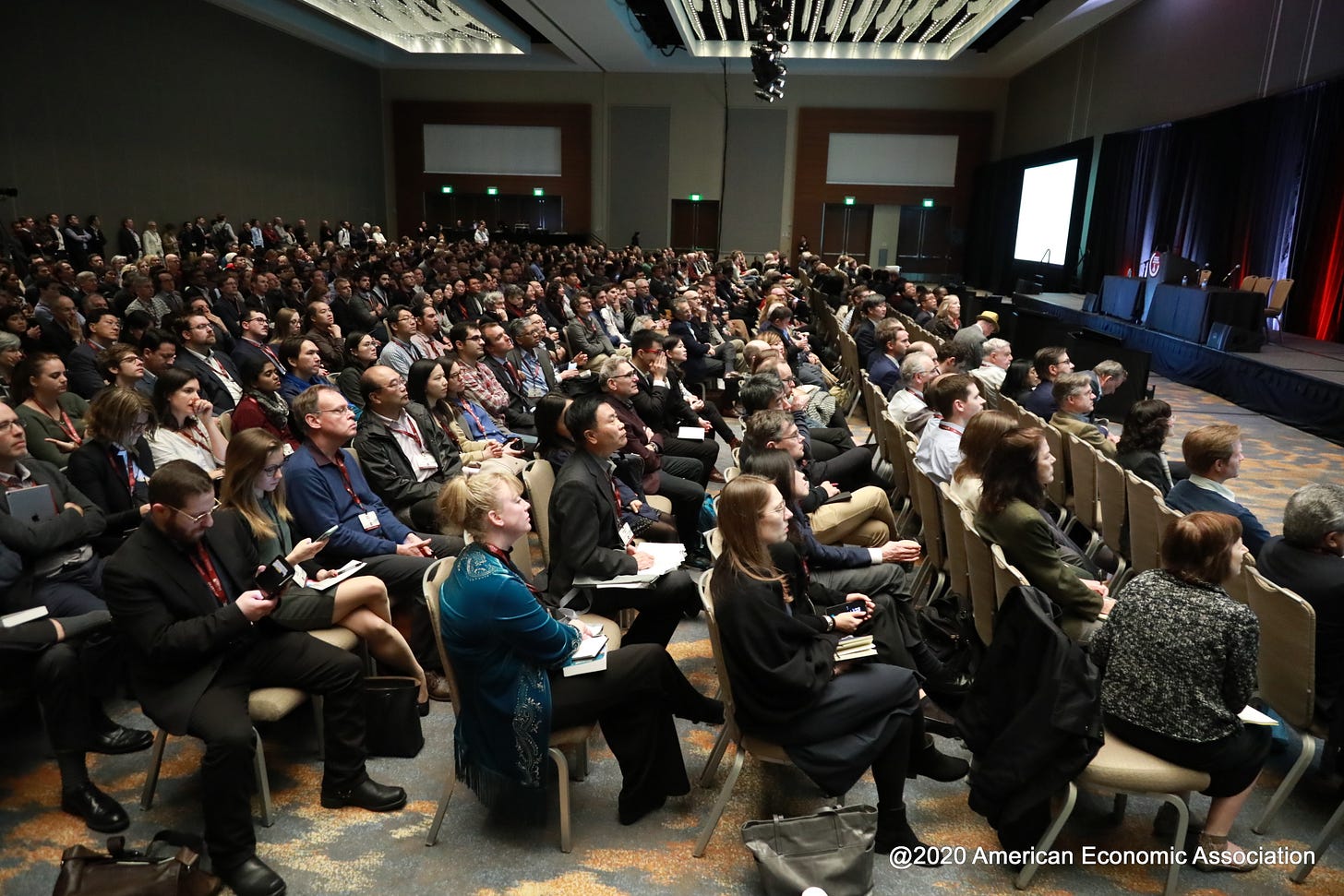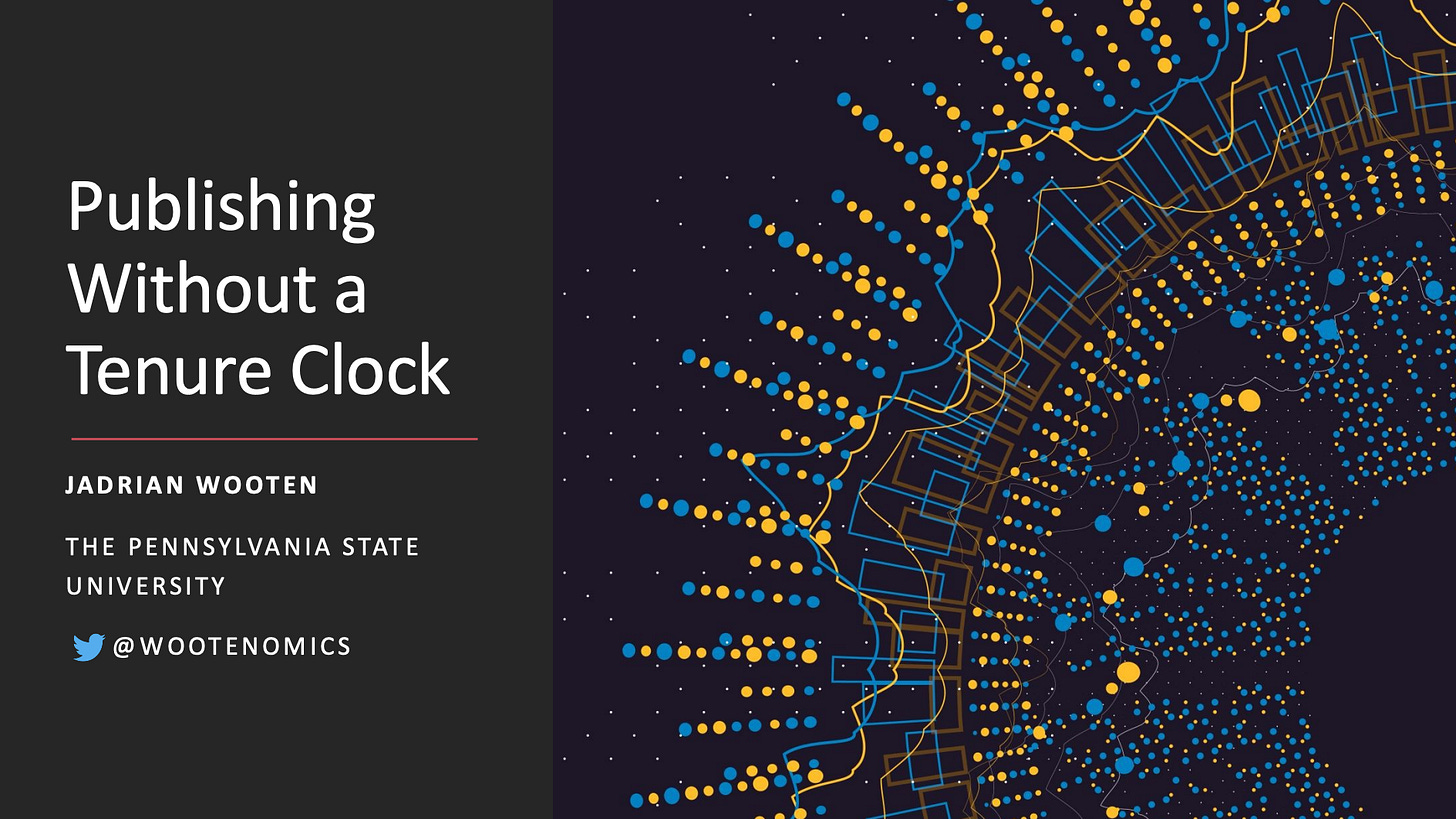Economists are Frustrating
Every year a large number of economists converge on a single city for multiple days to talk about the latest in economic research and comment on current economic policy. The Annual Meeting of the American Economic Association is a big deal to most economists, whether they’re working in academia, in the private sector, or for government agencies. This is also the primary meeting where graduate students are interviewed for new job openings. This year’s conference, as it was last year, was completely virtual to account for the pandemic.
The setup of the meeting was slightly better than last year, but most of the sessions I attended this year didn’t allow participants to chat with each other. The organizers really wanted us to log in on Zoom and just listen to a bunch of 20-minute talks. Some of the sessions I attended were different, but most of them wouldn’t even allow participants to chat during the session. I attended two of the three days and was quickly reminded of some of the other reasons I’m consistently frustrated with economists.

Let’s start within the profession and talk about status snobs. I’ve struggled a lot over the past decade with determining whether it’s even appropriate to call myself an economist. You read that right. I have a Ph.D. in economics and I don’t typically consider myself an economist. I’m part of a subset of economists who specialize in teaching economics, and a lot of us consider ourselves educators first and economists second. If I’m feeling good about myself, I may call myself an economics educator.
That self-doubt is magnified at meetings like the AEA Annual Meetings because I’m surrounded by thousands of other economists presenting on an incredibly broad range of topics. Some of the preeminent economists are at this meeting to share their work and their feeling of superiority comes with them to the conference, even if it’s virtual. Don’t get me wrong, there are A LOT of really great people in the field who respect the work of economic educators. There are also a lot of status snobs who don’t respect the opinion of anyone who isn’t a “serious economist” that is a professor at a top economics program. Claudia Sahm has a great post you should read:
There is a prevalent attitude across a lot of graduate programs that emphasizes placing graduates in tenure-track positions above all else. The whole profession is built on a ranking system that emphasizes publishing in top-ranked journals, presenting at exclusive conferences, and landing academic positions at top-ranked programs. Most of those are really insular and not easily available to the vast majority of the field. Todd Jones had an amazing visualization in his paper last year that showed how the top programs just shuffled their Ph.D. students between other top programs. In his sample, more than 75% of the faculty at the top two programs (Harvard and MIT) earned their Ph.D.s from either Harvard or MIT. Here’s a look at how graduate students flow from their Ph.D. Program (left side) to different departments (right side) based on the rank of those programs:
There are also hierarchical issues within programs as well based on what type of faculty member you are. For a lot of economists who opt for a teaching-focused role, we’re often viewed as somehow less of an economist than the graduates who opted for tenure-track positions. This is harder to see from the outside, but one place you can start to see some evidence of this is on faculty websites at various universities. If the department has a lot of faculty, the teaching faculty are occasionally listed in completely separate sections from the other faculty groups. A lot of universities assign particular titles like “teaching professor” or “instructional faculty” while the tenure-line faculty are often represented as the default “professor” or “faculty.” For all intents and purposes, you can ignore the assistant/associate distinction.
In November, I spoke on a panel at the Southern Economic Association meeting in Houston about navigating jobs that didn’t provide tenure. That’s right, teaching faculty also do research. Research faculty also teach classes. We really have a lot more in common than they may realize. For a profession that praises the concept of comparative advantage and specialization, we have somehow forgotten that we all benefit from the “gains from trade.” When the pandemic hit and schools were moving online, I watched a lot of research faculty pat themselves on the back for learning a lot of “new” teaching methods that economics educators have been presenting for decades.

Our panel in Houston had about 8 audience members who weren’t part of the panel despite the conference having a few thousand economists in one hotel and only about 2 dozen sessions running concurrently. One of the things I learned quickly was that most conference attendees don’t actually attend the majority of the conference. While tenure-track faculty may not be interested in this sort of panel, the lack of graduate students was disappointing. It wasn’t entirely surprising given that most of them are being told to avoid jobs with heavy teaching requirements. A lot of “serious economists” don’t really care all that much about teaching since it interferes with their chance to do research and chase the elusive “top 5” publication. I thought about including some screenshots here, but it would just be petty. There are bigger issues in economics besides this one.
One of the reasons I like regional conferences (like the Southern Economics Association) or field-specific conferences (like the Conference on Teaching and Research in Economic Education) is that I can find people who are passionate about improving how we teach economics, and actually improving the entire profession. These smaller conferences aren’t as overwhelming and I actually get to interact with other economists. I have learned so much more from smaller conferences than I have from the AEA Annual Meetings.
During one of the panels I attended over the weekend at the American Economic Association Annual Meeting, Carlos Asarta shared some of the results from a recent survey of introductory economics instructors. I’ve read (and cited) his paper multiple times over the past 6 months and I wanted to hear his interpretation of the results. The findings were not good.
For the past 20 years or so, economists have consistently delivered a standard “chalk and talk” lecture with relatively little active learning techniques despite mounds of evidence that active learning is beneficial for learning. Again, a lot of “serious economists” don’t care about the teaching part of their job. One of the only significant active learning changes over the past two decades was a reported increase in student-to-student discussion during class. There may be some evidence that instructors overestimate how much active learning they actually use in the classroom, but that’s a topic for another day.
The disheartening results of the survey were actually based on how rarely introductory instructors reference issues related to diversity, equity, and inclusion, and issues around gender. More than half of the surveyed instructors said they never referenced these issues in class. Here was the key slide from his presentation:
The reference band for “rarely used” was purposely made small enough (1% to 10% of the time) that a professor who thought they may have mentioned something could have marked that category, but instead, more than half of the respondents were comfortable saying they never mentioned these issues. You may think that these issues are reserved for upper-level courses, but the results of that survey were actually worse. A lot of college students will take only a single introductory course, which means most of them never learn how economics views these legitimate social issues.
Perhaps you may think it’s too difficult for professors to implement changes to their curriculum since there may not be that many resources available for them. You’d be very wrong. The American Economic Association has resources for building a more diverse, inclusive, and productive profession, separate committees focused on the status of minority groups in the profession, and provides a host of teaching resources aimed at improving diversity, equity, and inclusion. Despite decades of work, at the highest level of our professional organization, the economics profession continues to have a diversity problem. My frustration isn’t necessarily with the American Economic Association as an organization, but actual economists.
The economics profession has a host of widespread problems ranging from sexism and racism on anonymous message boards to thinking the profession is somehow superior to every other field. There have been more specific examples with recent cases of high-profile economists sexually harassing their research assistants and older issues involving the now current Director of the National Economic Council claiming that women were biologically inferior when it comes to science aptitude. The problems aren’t limited to those “serious economists” at prestigious universities. Last summer there was the Cal State East Bay economics professor who regularly taught his class that people of color are intellectually inferior and research studies that found women receive more (and more hostile) questions during research seminars. That of course assumes women are even invited to present at seminars to begin with.
Every year, I work with amazing colleagues who continue to develop resources for faculty to teach more inclusively. I constantly re-evaluate my own teaching methods and examples to ensure that I’m not stereotyping women and minorities in the examples I’m using in class. I sit through panels and presentations at conferences on ways to increase diversity and representation in the field. I know I’m not alone in this area, but every year I seem to come back to the AEA Annual Meetings and realize not much has changed and the people showing up to the conversations are the same people every year.
I fell in love with this subject and this profession a decade ago, but it’s disheartening to see how little things have changed. I’ll continue to fight for my students and work to make this profession more inclusive and more applicable to a wider audience of people. Beyond that, I’m at a loss for what I can do to make a difference. The notion of economics being a “dismal science” has taken on a whole new meaning for me.
There are 21,997 members of the American Economic Association [American Economic Association]
In 2020, there were 2,729 unique jobs listed on the AEA’s Jobs for Economists job board [American Economic Association]
Of 493 U.S. citizens or permanent residents who received a Ph.D. in economics in 2020, only 24 were Black [Brookings]
Based on a 2019 survey, only 17% of Black economists (strongly) agreed with the statement “people of my race/ethnicity are respected within the field” [American Economic Association]
Women earn almost 60% of bachelor’s degrees and 30% of economics degrees [Bayer & Wilcox, 2017]









I want to thank you for producing and curating materials for economics educators to use. Your posts and tweets and general curiosity have improved my high school level teaching because you have provided access to information (and your own instructional approach) that I would not otherwise have. I look forward to the Monday Morning Economist and the Tuesday Links to see what new thing(s) I can learn and use, as an educator. Your honesty and generosity with materials is doing a great service for the field and I hope that members of the AEA and your employers realize and value this!
On a related note---I stopped attending social studies conferences because there are few Economics teachers in attendance and so little relevant offerings for Economics instruction. I am so appreciative that you and a few others have more than made up for this gap.
I stopped going to the AEAs years ago in large part because much of the research presented there was so esoteric to border on meaninglessness, and the self-reverential attitudes of presenters (including some in the econ ed space) meant that productive conversations were few and far between. Thanks for sharing your thoughts so eloquently.